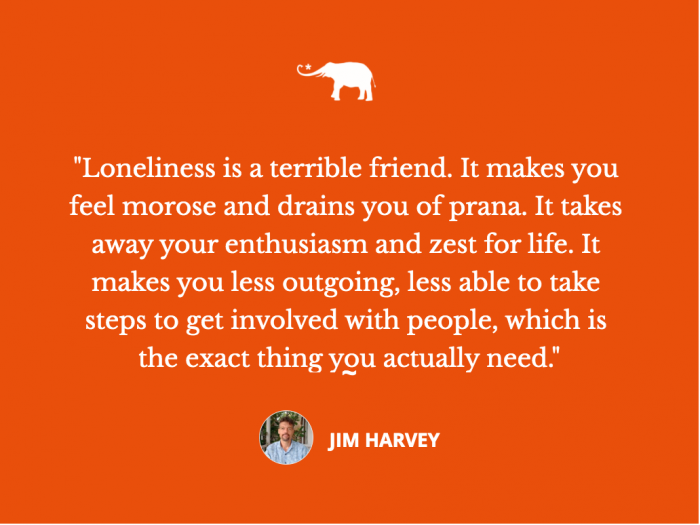~
My high school years were possibly the happiest time in my life.
I spent them at a lycée in France where I did well academically, got on well with everyone, and was popular among my classmates. Without being the “funny guy,” I did make people laugh.
I would play sports or do stuff like have picnics, go trekking, or just sit and enjoy hours of conversation in cafés with friends from school and outside alike.
Each morning, I would wake up feeling enthusiastic and eager to get on with the day.
University in France was harder. In the huge classes that are the norm there, particularly in years one and two, the environment was more anonymous. I had trouble making new friends and felt less at home. For the first time in my life, I began, on occasion, to feel lonely. So I moved to England and switched to studying at SOAS University in London.
There, I once again had a better social life. But since most of it revolved around pints in pubs, it felt much less meaningful than the varied activities I had shared with my French comrades.
After I graduated in Thai and Japanese, I drifted into language-related work and ended up translating books. The work was rewarding but solitary. It carried me through my twenties and early thirties. It defined the way I lived: being independent of place (I suppose I was one of the first “digital nomads“). It allowed me to travel, and since, at least initially, I could not afford to live in a Western country, I spent time in Thailand, Japan, and India. But it was precarious, irregular work, and circumstances (visas, for example) were constantly forcing me to relocate.
For a few years, I got a buzz out of this but gradually, I felt I was drifting toward the sidelines of society. Every time I moved to a new place, I had to rebuild my life from the foundations up. Let us remember this was in the early age of email, long before Skype, Whatsapp, and Facebook-enabled constant online connection. Loneliness and insecurity became my traveling companions. I felt like a substitute at a soccer match, sitting on the bench, wondering if I would get to play.
“Stop the world!” I wanted to say, “I want to get back on!”
My life became problematic. I had my first experience of alcohol abuse. There were moments of “quiet desperation.” I struggled to create the change I aspired to. I began to feel powerless—not a victim exactly, but that life was living me, and not the other way about. I sought the lost happiness and the carefree heart I once had in my youth. I neglected communication with my family. I aspired to a different livelihood that would reconnect me to people and allow me to stay put in one place, at least for a while, but I was failing to find or create it.
I yearned for a stable relationship, but I was sometimes troubled and constantly on the move. So this, or, in fact, any relationship remained elusive. And over the years, my loneliness and sense of disconnection and of skimming over the surface of life had only deepened.
Loneliness is a terrible friend. It makes you feel morose and drains you of prana. It takes away your enthusiasm and zest for life. It makes you less outgoing, less able to take steps to get involved with people, which is the exact thing you actually need.
It becomes a default emotional state, but just like the constant hum of a refrigerator in your home that you no longer hear because it is constant, you are no longer even aware of your pain.
I began to feel like a man alone in a waiting room, wondering when I would be allowed out and get the chance to once more be the sociable, gregarious, and active participant in life whom I knew myself to be deep down. My mental and emotional health was wavering. There was a constant, dull pain in the background of my awareness but also in my body-mind, which, although it varied in intensity, never quite disappeared.
But it was not all doom and gloom. There were many happy moments too. But they were fleeting and I could not make them last, let alone turn them into a happier life situation.
I felt helpless, unable to return to the arena, the playground, and the stage where life was happening. And, at times, it made me desperately miserable. It seemed so absurd that all the things I had taken for granted in my youth now seemed beyond my reach forever.
Slowly, I emerged from those darker years. But I have never quite regained the thoroughly bearable and indeed blissful “lightness of being” I had during my teens. Even here, in beautiful Bali, the current circumstances due to the world situation sometimes revive my solitude.
And then, a few days ago, I had a dream.
In the dream, I was in the dormitory of a huge house in the country, putting my stuff in the space under my bunk. The place was bustling and, not surprisingly in hindsight, many of my high school friends were there.
We were joyfully reunited, embraced each other, patted each other on the back, and much banter was exchanged. Later, we all went on a coach trip—an excursion with people from other dorms. Again, there was much laughter, sharing, and some sightseeing.
When we got back, I began chatting with a girl I didn’t know. We confided in each other and she mentioned some issues she was struggling with. I gave her my perspective and she seemed delighted. “I can solve almost any problem,” I told her, grinning, “except the ones I can’t!” This was both untrue and an extremely lame joke, but in the dream, it was quite funny. I remember the thrill of connecting with my new acquaintance through laughter. And out of the blue, like a bolt of lightning, a thought came: “There is nothing wrong with me. Absolutely nothing! I just need this human connection, this contact, to be a part of something once again!”
When I awoke, I was as though shell-shocked. I had no idea where the dream had come from. But I knew that it was the expression of a profound but simple truth.
In my late teens and early twenties, I had worked summers in holiday camps for children who would come and stay for three weeks in a chalet in the French Alps. Our group of young adults, the staff, would take them camping, hiking, swimming in rivers or lakes, and have sing-songs with them around campfires.
We would make things together, like draw, paint, or tend to the vegetable garden. We were part of something; we were a team.
For sure, at times, the lack of sleep and the fact that there was never a moment to respite from our seven to 12-year-olds could put people on edge. But conflicts were always resolved amicably. We became like a huge family—a mini-community.
And when it ended and we all had to go our separate ways, it felt like a gaping hole opened up in our hearts.
I miss those days. I miss the camaraderie, the connection, and the sheer joy. What could be more precious?
But my dream was a gift, and it was deeply healing.












Read 4 comments and reply